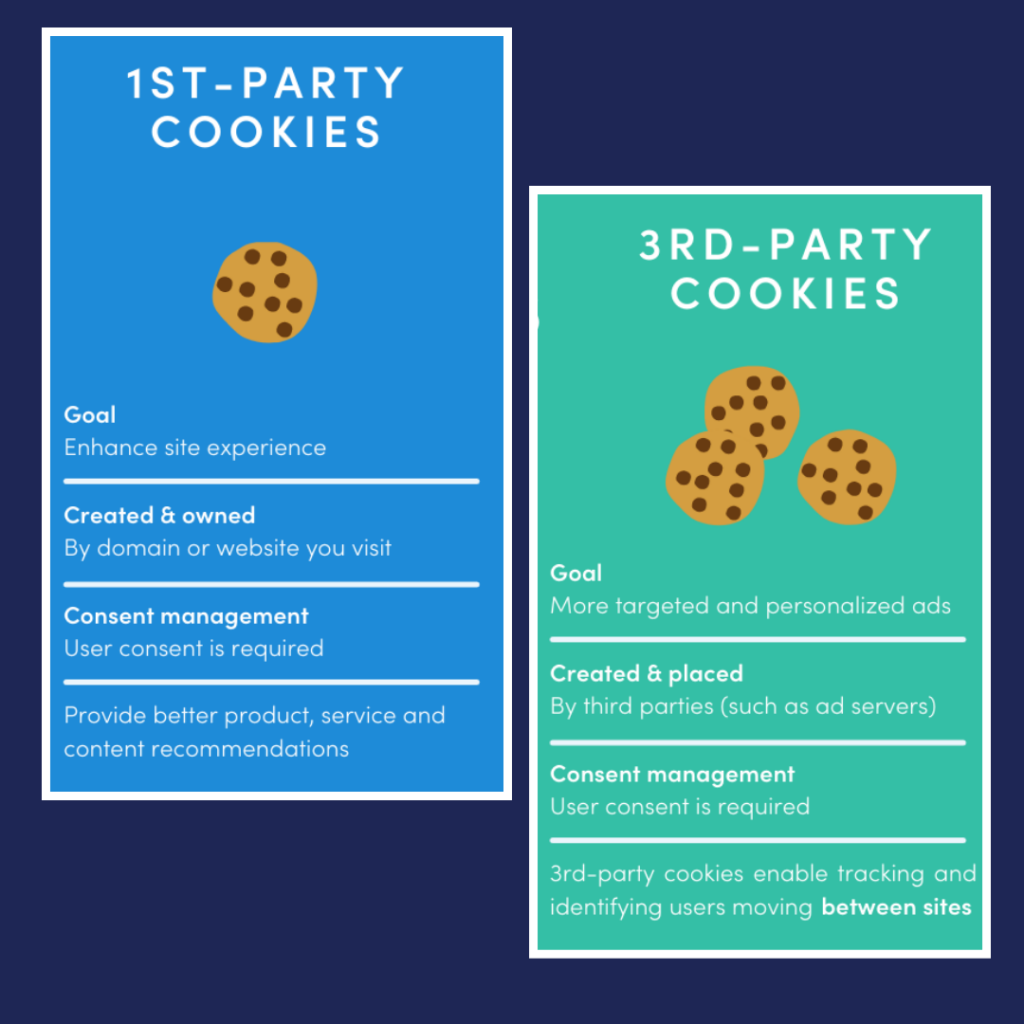What is a Cookieless Future?
Google announced a major shift in the ad world…the deprecation of third-party cookies slated for Q3 2024. A cookieless future means change for advertisers. Some of these changes are positive and some may lead to new ways of conducting our work and reaching those coveted prospective renters.
What Marketers Need to Know
Google announced the deprecation of third-party cookies as a part of their larger privacy initiative titled, The Privacy Sandbox. By kicking third-party cookies out of the picture, Google aims to improve users’ online privacy and reduce cross-site tracking. To understand what a cookieless future means, advertisers should know the main differentiators between first-party and third-party cookies.
Let’s get this party started.
First-Party Cookies
First-party cookies are data placed on a website to collect user behavior. This data is managed and hosted by the website that the user is visiting. The main purpose of first-party cookies is to tailor seamless usability to each user. Think of first-party cookies as a website remembering your language preferences, passwords, and that item you left in your shopping cart. First-party cookies are considered “privacy-safe” and will not be deprecated by Google in 2024.
Let’s start with an easy-to-understand example:
You head to your friend’s house for a game night and they have all of your favorite snacks on hand (score!). This friend knows you well, and like any good friend, they know that cheese and crackers are your favorite. You’ve gone to this friend’s house before, so it makes sense that they know and have your favorite items when you walk in the door. Think of these ‘preferences’ as first-party cookies.
Now let’s continue the party with third-party cookies.

Image by Datatrics
Third-Party Cookies
Third-party cookies are pieces of data placed in the form of scripts or tags that gather data based on user behavior. These cookies help digital advertisers create highly personalized and relevant advertisements for their target audience by analyzing user behavior well beyond the hosted website. The reason these cookies are deemed third-party is because the cookies are created by an external source, not the website owner. So what’s the problem?
Well, let’s stick to the cheese and crackers scenario.
While you were at your friend’s house, your friend stuck a tracking device on you to monitor not only your cheese and cracker consumption, but also what your favorite candy, drinks, and other favorite snacks are. So now, when you go to a new friend’s house, they have all of your favorite items. But how? You never shared this information with anyone. Well, that sneaky little tracking device has shared that information with a third party that is now tailoring your food and drink preferences to wherever you go.
How This is Applied in Multifamily Marketing
Previously, advertisers could track this user’s whereabouts well beyond your property’s website. This third-party cookie may follow a potential renter to CNN.com, deep within a Reddit feed, or any other website that the user visits. Advertisers then use this information to display relevant ads to your property. These cookies are considered non-essential and an invasion of privacy…thus, their deprecation.
The Cookieless Timeline
You’ve heard that the impending doom of third-party deprecation is looming, but in reality, advertisers have time to decide on how to proceed. On January 1, 2024, Google Chrome disabled third-party cookies for 1% of users. Google claims that 100% deprecation of cookies will occur sometime in Q3 or Q4. However, if history repeats itself, we know Google doesn’t always stick to timelines. ICYMI, in January 2020, Google stated that all third-party cookies would be deprecated in early 2022.

To calm your nerves, it’s important to note that other browsers such as Safari and Firefox deprecated third-party cookies years ago. Google is late to the game for many reasons, including the possibility of declining ad revenue and continued testing in the Privacy Sandbox.
The Cookieless Future in 5 Steps
Now you’ve heard the background. The next question is what can multifamily marketers do to prepare and mitigate the effects of this change?
Step One: Call Tracking and Conversions, Help!
- Digible recommends utilizing privacy-safe call tracking providers to keep privacy top of mind. Ask your call tracking provider about which type of cookies they utilize on your property website to ensure they’re first-party. Digible’s call-tracking software, FionaCalls does not use any third-party cookies, hurrah! FionaCalls utilizes session storage that will automatically be wiped when a user closes the browser, meaning no tracking beyond your property website occurs. In addition to this, we utilize this first-party data to fuel our campaign strategies. When we receive a qualified phone call, this data is ported back into campaigns to fuel algorithms and bid on more qualified users, all without using third-party cookies.
- More good news! As far as conversions are concerned, Digible has fully transitioned all of our clients to GA4 as our source of truth for conversion and analytics tracking. GA4 utilizes first-party cookies set by the analytics.js library allowing for the collection of data directly from a website visitor. Digible recommends all multifamily marketers adopt an analytics vendor that utilizes first-party cookies for data collection and analysis.
Step Two: Contextual Advertising
- Although we are unable to track user activity across multiple websites, we are still able to reach a targeted audience through contextual advertising. Contextual advertising works by targeting users who interact with the content of a webpage vs. tracking individual user behavior. Google offers many forms of contextual advertising that will be key to navigating a cookieless future, specifically for any programmatic efforts. Topics, placements, and keywords will play a key role in reaching the right audience in a compliant, and privacy-centered way.
Step Three: Diversify Your Media Mix
- Digible offers a full suite of products that reach potential renters at each point in the marketing funnel. Some of these products, like programmatic retargeting, rely heavily on third-party cookies to personalize and reach prospective renters. Retargeting campaigns will suffer from smaller audience pools making it more difficult to reach users who have visited your property’s website. A plus side to this is that retargeting dollars will no longer be wasted on current residents who frequent your property websites to pay rent. Digible recommends supplementing campaigns with the following upper-funnel platforms which focus on awareness at the top of the funnel. These platforms are aimed at driving qualified users to your website and help to foster leads lower in the marketing funnel.
Step Four: First-Party Data Collection
- Effective use of first-party data and CRM (Customer Relationship Management) data will be key in this new era of advertising. How can you apply this in multifamily advertising? A great example of this is encouraging property website visitors to willingly share their data in exchange for a value proposition. By opening the door for users to opt-in to data sharing, advertisers gain trust and a more transparent relationship with their audience, and in turn, advertisers create a more personalized experience for future residents. First-party data collection can happen in a variety of ways including Chatbots, Contact Forms, Schedule a Tour submissions, and any other website prompt that encourages information sharing.
Step Five: Privacy is King
- Now, more than ever, advertisers will be rewarded for championing privacy-focused data collection and implementation. Advertisers are encouraged to leverage strategies that focus on protecting user privacy vs. highly personalized and targeted advertising. Advertisers who abide by and stay attuned to privacy changes will reap the benefits in customer satisfaction and retention.
The deprecation of third-party cookies indicates a paradigm shift in the multifamily digital marketing landscape, which demands adaptation and innovation from all advertisers. Embracing first-party data collection, and adopting new media platforms, all while prioritizing user privacy will be essential for the industry to navigate this new party successfully.
Questions? Concerns? Drop us a line.
 $100K Lease-Stakes
$100K Lease-Stakes 








